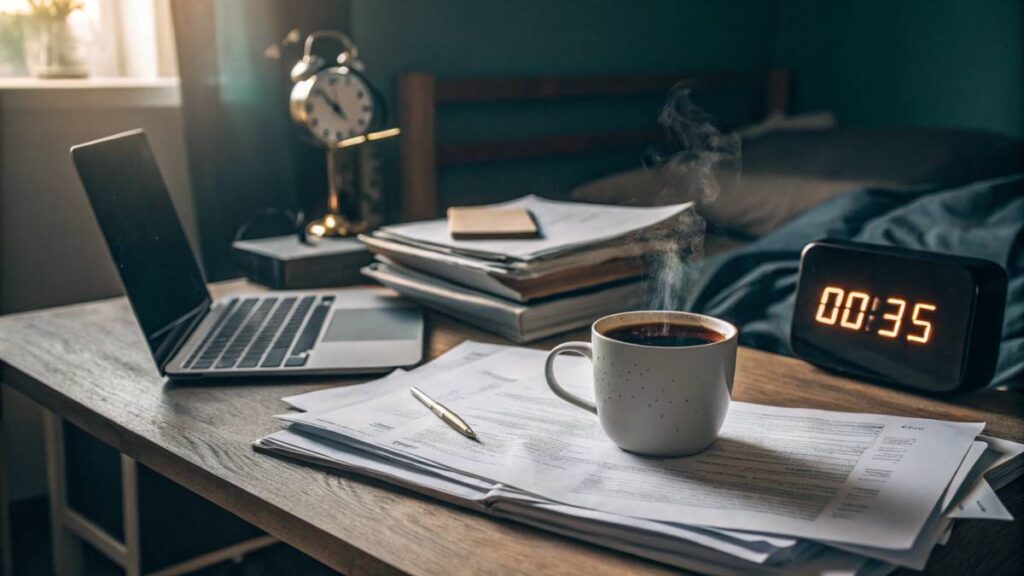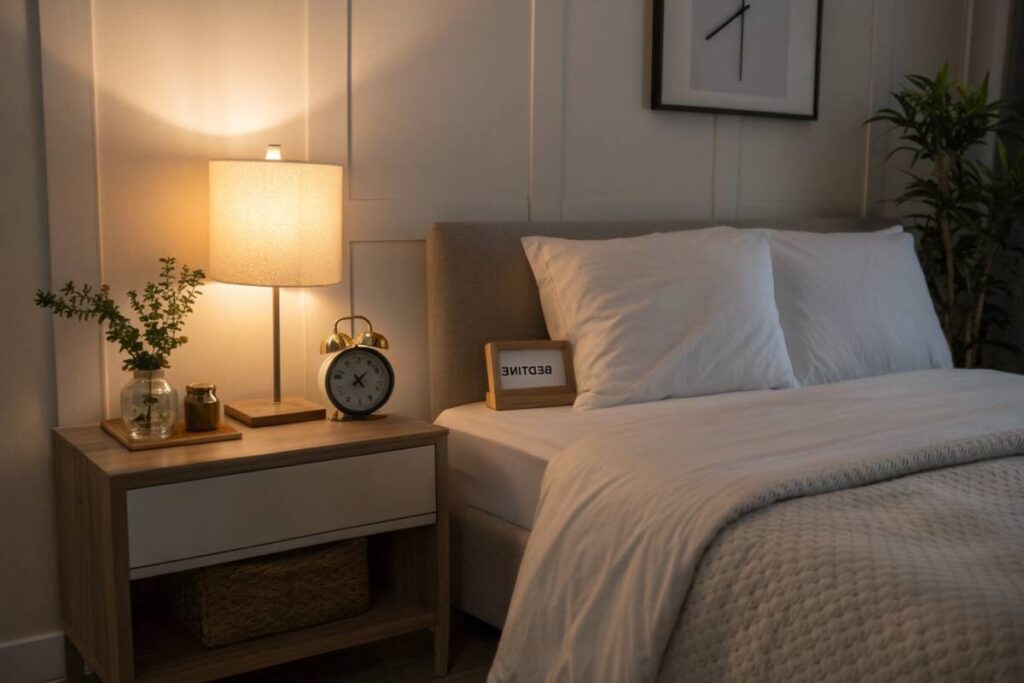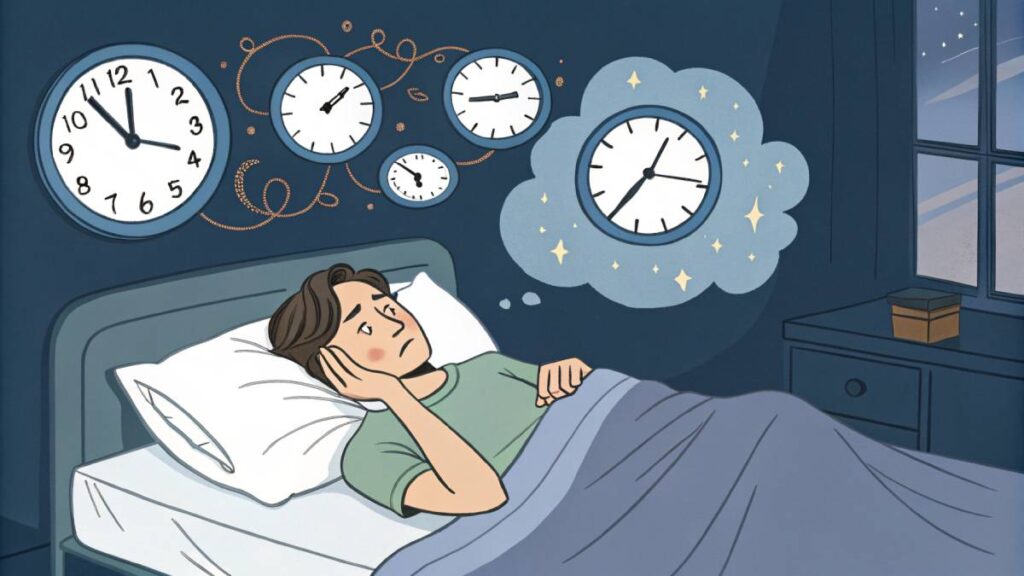Ever find yourself staring at the ceiling, counting sheep, yet feeling further from sleep than ever? Insomnia isn’t just about missing a few hours of shut-eye; it’s a cycle that can sap your energy, mood, and even long-term health. Understanding the root causes and impacts of insomnia is the first step in reclaiming restful nights—and this guide is here to help you navigate that journey.
Key Takeaways
- What Is Insomnia? It’s a persistent struggle to fall asleep, stay asleep, or wake up too early, leading to insufficient rest. It can be acute, chronic, or situational.
- Common Causes: Stress, anxiety, lifestyle habits, medications, and age-related changes are key culprits.
- Impact on Health: Insomnia negatively affects physical health (e.g., immunity, weight gain) and mental well-being (e.g., anxiety, depression).
- Types of Sleeplessness: From acute to chronic and sleep-onset insomnia, understanding the variations can help address specific issues.
- Breaking the Cycle: Lifestyle adjustments, relaxation techniques, and cognitive-behavioral therapy (CBT) offer effective ways to improve sleep.
- When to Seek Help: Consulting healthcare providers and undergoing sleep studies can provide personalized solutions.
Understanding Insomnia
Understanding insomnia is the first step in overcoming this all-too-common sleep struggle that affects millions worldwide. Insomnia isn’t just about losing sleep; it’s a persistent issue that disrupts your nights and impacts your days, leaving you feeling drained, irritable, and unfocused. Whether it’s the occasional restless night or an ongoing battle with sleeplessness, identifying the root causes and understanding the different types of insomnia can provide valuable insights. By learning what triggers it and how it manifests, you can take practical steps to regain control, improve your sleep quality, and restore balance to your life.
“A consistent sleep schedule is the backbone of quality rest. Without it, our internal clocks are left guessing.” – National Sleep Foundation
Definition of Insomnia
Insomnia’s like that stubborn riddle you can’t solve. It’s when you can’t fall asleep, stay asleep, or you pop up too early and can’t snooze again. It messes with your night’s rest, leaving you tired and cranky. Insomnia’s not one-size-fits-all, here’s the lowdown:
| Type of Insomnia | What It Means |
|---|---|
| Acute Insomnia | A short stint of sleep troubles triggered by stress or a change in scene. |
| Chronic Insomnia | Sleep problems that hang around for at least three nights a week, over three months or more. |
| Middle Insomnia | You keep waking up in the middle of the night, often thanks to stress, anxiety, or health issues. |
Common Causes of Insomnia
Nailing down what’s messing with your sleep is key if you want to break free of insomnia’s grip. Different things can throw a wrench in your sleep routine.
| Cause | What’s Happening |
|---|---|
| Stress and Anxiety | Your mind’s racing like a car; emotional woes keep you wide-eyed. Insomnia vs anxiety explores how these two dance together. |
| Medications | Some pills, whether prescribed or not, can mess with your shut-eye. |
| Lifestyle Choices | Caffeine, booze, and wacky sleep schedules can mess up your snoozing. |
| Age-Related Changes | As you get older, sleep patterns might switch, sometimes leading to more insomnia. |
| Shift Work | Odd working hours can turn your sleep schedule into a jigsaw puzzle. |
Figuring out causes is vital for those caught in the insomnia cycle, like new parents missing out on Z’s, night shift workers, and seniors grappling with sleep shifts. To fight insomnia, check out other strategies like munching on foods that help you sleep or trying exercise for insomnia.

Impact of Insomnia
Not getting enough shut-eye? Insomnia’s got your number. It quietly chips away at your body’s hustle and your brain’s groove. So, if you’re ready to knock insomnia off its pedestal and reclaim your snooze, let’s have a closer look.

Effects on Physical Health
Skipping the zzz’s marathon? Your body won’t thank you. Lack of sleep is like leaving the door open for sneaky health problems. Your defenses can take a hit, leaving you more exposed to colds and the flu. Then there’s the risk of diabetes creeping in thanks to sluggish insulin response, followed by heart mischief like high blood pressure. And yes, missing those winks can throw your hunger hormones into chaos, tipping the scale towards weight gain.
| Physical Health Bummers | More Details |
|---|---|
| Immune System on Vacation | Easier for germs to crash your party. |
| Diabetes | Your body’s sweet deal with insulin? Not so sweet anymore. |
| Heart Havoc | Looming threats like lightning-fast heartbeats or thinking you’re always on a treadmill. |
| Packing Pounds | Appetite hormones head to a fast-food joint. |
Some folks feel the sting more than others. Think about new moms and those working odd hours—they’re often sleep zombies with amplified health woes. Running low on energy spills over into their days, leaving life’s parade soggier than a wet towel. Wanna bounce back and hit snooze without guilt? Check our guide on exercise for insomnia.
Effects on Mental Health
Sleep isn’t just golden for physical symptoms—your mental playlist takes a hit too. Battling sleep? It’s like adding fuel to anxiety’s fire. Rinse and repeat becomes the new normal, making it tough to spot the silver linings, make solid calls, or keep moods from seesawing.
| Mind Games & Nightmares | Breakdown |
|---|---|
| Cranked-up Worry | Sky-high stress levels with a side of jitters. |
| Blue Feels | Sleep-stealing blues paint on an extra coat. |
| Mood Hurricanes | Random outbursts and low patience level in tow. |
| Brain Short-Circuits | Can’t remember why you walked into the room? Yep, sound familiar. |
Living in a cloud of fatigue can make dealing with life’s hiccups a chore. Who wouldn’t prefer more laughs with friends and less “I just can’t even”? Check out our thoughts on insomnia vs anxiety, and for relaxation solutions, meditation for sleep might just hit the reset button on your frazzled nerves.
Getting wise to what insomnia’s up to can spur you onto better sleep habits. Embrace the challenge, and rise above counting sheep in no time!
Breaking Down Your Sleepless Cycle
Cracking the mystery of different kinds of sleep troubles and spotting what sets them off is like finding the missing pieces to get your sleep back on track. Knowing this stuff can put you in the driver’s seat to make changes and finally get some solid shut-eye.

Types of Sleeplessness
Sleeplessness comes in all shapes and sizes. Getting a grip on each type can be your first step toward figuring out how to tackle them. Here’s a quick rundown of the usual suspects:
| Sleepless Type | What’s Going On |
|---|---|
| Acute Insomnia | This is a short-lived sleep issue, usually because of stress, life twists, or noisy neighbors. It often sticks around for a few days to weeks. |
| Chronic Insomnia | Now, this one’s the long-hauler. It’s when you struggle with sleep at least three nights a week over a few months or more. Often ties back to health nicks or non-stop stress. |
| Sleep Onset Insomnia | Trouble catching those Z’s when you first hit the hay. It’s often made worse by stress or an overactive brain. |
| Sleep Maintenance Insomnia | The midnight wake-up call and the struggle to return to dreamland. Could be an age thing, medication effect, or just lifestyle choices. |
| Middle Insomnia | Waking up in the dead of night and fighting to fall asleep again. Commonly linked to anxiety or health glitches. |
Figuring out which kind you’ve got can help steer you in the right direction for better sleep.
Spotting Patterns and Culprits
Nailing down what’s throwing off your sleep is the ticket to managing it better. Here are a few usual culprits you might want to consider:
Usual Culprits
| Culprit | What It Is About |
|---|---|
| Stress and Anxiety | Dwelling on work woes, family drama, or big life events can spin the mind into overdrive just when it should be hitting the brakes. Dive deeper into this in our chat about Insomnia vs anxiety. |
| Caffeine and Other Eye-Openers | Getting your caffeine hit too late in the day can seriously mess with sleep. |
| Wonky Sleep Schedule | If you’re a shift worker or just have odd bedtime habits, regular sleep rhythms can be tough to hold onto. Sleep pressure elaborates more on this. |
| Room Setup | Noisy night, ugly sheets, or too much light can kill your rest. Check out more about best blackout curtains for sleep for better snooze conditions. |
| Health Issues | Got aches, depression, or hormonal swings like pregnancy? They can all throw sleep off track. Peek into depression and insomnia for more insights. |
By jotting down a sleep diary, you can keep tabs on your sleep habits, spot the times when insomnia hits hardest, and see which triggers show up repeatedly. This self-check can help you better figure out your sleep mess and make tweaks to improve how you nap.
Getting a handle on these patterns and helping others learn from your insights could be your golden ticket to better sleep—and might even help you squash the stress and enjoy that sweet ticket to dreamland. Learn more about how to break the insomnia cycle.
Lifestyle Changes for Better Sleep
Tweaking your daily groove might just hold the secret to catching those elusive Z’s. Creating a chill nighttime ritual and setting up a snooze-worthy space are two big steps for anyone trying to figure out how to kick insomnia to the curb.
Establishing a Bedtime Routine
Think of a bedtime routine as a series of gentle nudges telling your body it’s time to hit pause. Doing the same soothing activities every night gets you prepped to nod off more easily. Here are some things to slot into your nightly routine:
| Activity | Duration |
|---|---|
| Dim those bedroom lights | 30 minutes |
| Dive into a mellow activity (reading, chilled-out tunes) | 15-30 minutes |
| Ditch screens (like your phone or tablet) | 1 hour |
| Try relaxation moves (try deep breaths or a bit of meditation) | 5-10 minutes |
Sticking to the routine is really the magic trick. Aim to hit the sack and roll out of bed around the same time every day, weekend fun or not. This kind of regularity can help get your body’s clock ticking nicely, leading to sweeter dreams. If you’re curious about how a morning routine could also shape up your sleep, check out our piece on morning routine for insomnia.
Creating a Sleep-Conducive Environment
Where you park it for shut-eye seriously matters. Crafting the ideal setting for dozing off takes a little effort but pays off big time. Here’s how to make your snooze space snug enough for dreamland:
| Element | Recommendation |
|---|---|
| Room Temp | Chill it out a bit (aim for 60-67°F) |
| Lighting | Block the outside glare with blackout curtains; keep indoor lights soft and warm come nightfall |
| Noise Level | Muffle intrusions with a trusty white noise machine or sound device |
| Bedding | Splurge on a comfy mattress and squishy pillows; pick breathable fabrics |
| Clutter | Keep it tidy to calm the mind and ease stress |
Change up these parts of your sleep-space for more peaceful slumber sessions. If you’re after a checklist to perfect your sleep game, peek at our sleep hygiene checklist.
With these lifestyle tweaks nailed, you’re on track to ditch insomnia and boost your overall groove. For a closer look at munchies that help with catching Z’s, drop by our article on foods that help you sleep.
Cognitive-Behavioral Techniques
When sleep’s got you tossing and turning, cognitive-behavioral techniques might just be your ticket to snooze town. Let’s chat about how wrangling those pesky thoughts and habits can lead to some serious shut-eye improvements.

Cognitive Therapy for Insomnia
Dive into a little mind magic with cognitive therapy, aiming to tweak those unhelpful thoughts messing with your sleep mojo. Folks often spin their wheels on worries like a hamster on caffeine, cranking up the anxiety and keeping sleep out of reach. Cognitive Behavioral Therapy for Insomnia (CBT-I) is your sleep coach, ready to turn the tables on insomnia:
- Spot the sleep-slaying thoughts lurking in your mind.
- Knock those thoughts down a peg with some reality checks.
- Start thinking about sleep in a positive light, with as much love as a nap on a lazy Sunday afternoon.
| Cognitive Techniques | Description |
|---|---|
| Thought Record | Scribble down the negative mind ramblings and swap ’em for sunny affirmations. |
| Sleep Education | Get the 411 on sleep cycles and what makes a good night’s sleep tick. |
| Mental Imagery | Float off on a mental vacation to tranquil locales right before you hit the sack. |
Try out these cognitive tricks and watch that insomnia cycle crack like an egg on a hot sidewalk. More juicy insights await in our piece on does CBT-I work.
Behavioral Changes for Improved Sleep
Tinker with your routine, and watch as Dreamland welcomes you with open arms. Adjusting some day-to-day practices can drastically turn the tide on sleep quality. Here’s the lowdown:
| Behavioral Changes | Description |
|---|---|
| Sleep Restriction Therapy | Pull back on your bed hours to pump up your body’s desire to sleep. Curious? We explain more in our sleep restriction therapy article. |
| Consistent Sleep Schedule | Hit the hay and rise at the same hours daily to sync your body’s inner tick-tock. |
| Avoiding Stimulants | Kick caffeine and nicotine to the curb, especially before bedtime. |
| Exercise Regularly | Get your body moving to sleep like a baby. Check out our exercise for insomnia guide for more info. |
Working these behaviors into your routine can help put those sleepytime blues to bed. Focus on crafting habits that lull you into dreamland each night. Curious about other tactics? Check out meditation for sleep or build a sleep hygiene checklist to reinforce your nightly snooze setup.
Relaxation Techniques
On the quest to ditch the never-ending insomnia ride, finding your groove with relaxation techniques can really help dial up your sleep quality. Two mighty practices in your arsenal are deep breathing exercises and progressive muscle relaxation. These little gems work wonders in soothing the noggin’ and setting up the body for a comfy, snuggly sleep session.
Deep Breathing Exercises
Imagine this: breathing deliberately and deeply to chill out your vibe. This can be like hitting the pause button on stress, easing you into a state where dreams come easy.
Steps for Deep Breathing:
- Get cozy: Plop down in a relaxed spot—be it seated or lying down.
- Shut those peepers: Helps cut out the noise, literally.
- Take a big ol’ breath in: Inhale through your nose for about four beats.
- Hang on for a sec: Let the air linger in your lungs, count to four.
- Blow it out gently: Exhale through your mouth for a count of six.
- Repeat: Do this whole shebang for a few minutes, zoning in on your breathing.
Sorting out a chill breathing drill could look something like this:
| When | How Long | What |
|---|---|---|
| Morning | 5 mins | Deep breathing kicks off the day |
| Afternoon | 5 mins | Quick mindful breath-up |
| Night | 10 mins | Deep breaths lull to sleep mode |
Progressive Muscle Relaxation
Progressive muscle relaxation, or PMR if you’re into shorthand, has a pretty hands-on approach. It’s all about tensing up parts of your body and then letting ’em go. This can cue you into spotting tension and flushing it down the drain.
Steps for Progressive Muscle Relaxation:
- Get comfy: Choose a chill, quiet place to sit or lie down.
- Start with your toes: Squeeze the muscles in your feet for five seconds.
- Let go: Melt away any tension in your feet.
- Work it up: Keep moving up your body, tensing and relaxing muscles (legs, tummy, arms, neck, face).
- Tune in: Notice the difference when you’re tense and then chilled out.
- Wrap up with breathing: Cap it off with a round of deep breathing to lock it all in.
Try organizing your PMR like so:
| Muscle Group | Tension Hold (secs) | Relaxation Hold (secs) |
|---|---|---|
| Feet | 5 | 10 |
| Legs | 5 | 10 |
| Abdomen | 5 | 10 |
| Arms | 5 | 10 |
| Neck | 5 | 10 |
| Face | 5 | 10 |
Getting the hang of deep breathing and PMR can be your secret weapons against insomnia. Pulling these practices into your evening shenanigans could open the door to sweeter dreams and a feel-good life. Want more tips? Check out our sleep hygiene checklist to level up your sleep zone.
Seeking Professional Help
Fighting insomnia alone? That’s like bringing a spoon to a knife fight. A pro can show you the ropes and help you catch some much-needed z’s. Chatting with a health guru and checking in with a sleep study might just put you on the path to dreamland.
“Sometimes, insomnia requires a multi-faceted approach; seeking professional guidance is often the first step to uncovering the right solution.” – American Academy of Sleep Medicine
Consulting a Healthcare Provider
If insomnia keeps crashing your nightly party, it’s a good idea to call in the doc. They can give your sleep habits the once-over, dig into your health history, and suss out any sneaky causes like stress, meds, or other lurking issues. Here’s what they might want to know:
| Key Questions | Purpose |
|---|---|
| How long’s this sleep thief been at it? | To see if it’s just a rough patch or a long-term squatter |
| What’s your sleep scene like? | To figure out if it’s a bad case of bedtime chaos |
| Which pills are in your medicine cabinet? | To spot any culprits messing with your snooze |
The doctor might devise a plan: maybe some new bedtime rules, therapy sessions to unclog your brain or a short stint with sleep meds. Curious about how this relates to other issues? Check out Insomnia vs. Anxiety on our website.

Sleep Studies and Treatment Options
Sometimes, your doctor might say, “Let’s take a closer look.” Enter the sleep study—no, you won’t have to pull an all-nighter. This look-see checks everything from brain waves to breathing, especially if your sleep dance is more offbeat than usual.
Based on the results, the doc might suggest a few tricks:
| Treatment Option | Description |
|---|---|
| Cognitive Behavioral Therapy for Insomnia (CBT-I) | If your insomnia’s gone nuclear, a little help from short-term meds might be on the menu. Just hash out any risks and side hustles with your doctor first. |
| Sleep Restriction Therapy | Cutting down on your bedtime to match real sleep time, making those periods of sleep more efficient. Learn more in our article on sleep restriction therapy. |
| Medications | Cutting down on your bedtime to match real sleep time, makes those periods of sleep more efficient. Learn more in our article on sleep restriction therapy. |
Tackling insomnia isn’t a one-size-fits-all gig. Usually, it’s a team effort, bringing together a bunch of strategies that fit like a glove. And if you’re dealing with other life hiccups like a bun in the oven? We’ve got you covered with things like pregnancy insomnia remedies.
Getting a professional in your corner and maybe a sleep study on the ticket can give insomnia the boot. Sweet dreams!
Conclusion
From stress-driven nights to chronic wakefulness, insomnia can feel like an unwinnable battle. But understanding its triggers and impacts empowers you to reclaim the restorative sleep you deserve. Whether it’s through simple lifestyle changes, relaxation techniques, or seeking professional help, there’s a path to brighter mornings. Let this be the start of your journey to better rest, sharper focus, and a more vibrant life.
FAQs
What are the main types of insomnia?
Acute insomnia, often short-lived, arises from temporary stress. Chronic insomnia persists for over three months. Others include sleep-onset insomnia (difficulty falling asleep) and middle insomnia (waking during the night).
How does insomnia affect physical health?
Chronic insomnia can weaken your immune system, disrupt hormonal balance, increase diabetes and heart disease risks, and contribute to weight gain.
What lifestyle changes improve sleep?
Establish a consistent bedtime routine, create a sleep-friendly environment, and avoid stimulants like caffeine before bed. Regular exercise and a healthy diet also help.
When should I see a doctor about insomnia?
Consult a healthcare provider if insomnia persists for weeks, significantly impacts daily functioning, or stems from underlying health issues.
How does Cognitive Behavioral Therapy (CBT-I) help with insomnia?
CBT-I targets negative sleep patterns, replacing them with healthier habits and thoughts, leading to more consistent, restorative sleep.
Resources
- National Sleep Foundation:
https://www.sleepfoundation.org - American Academy of Sleep Medicine:
https://aasm.org - National Institutes of Health – Sleep Health:
https://www.nhlbi.nih.gov








